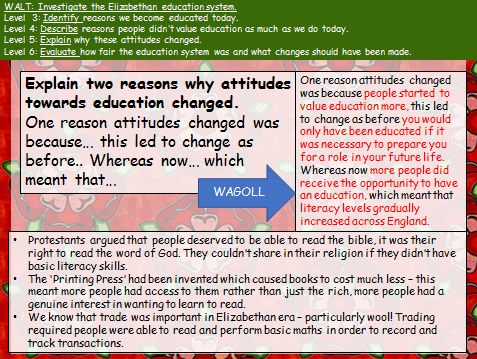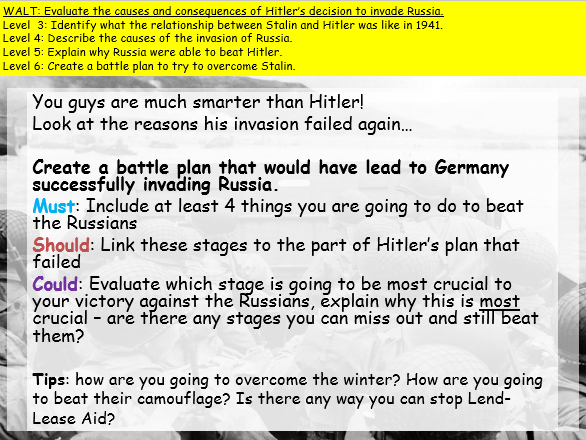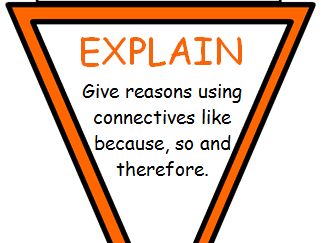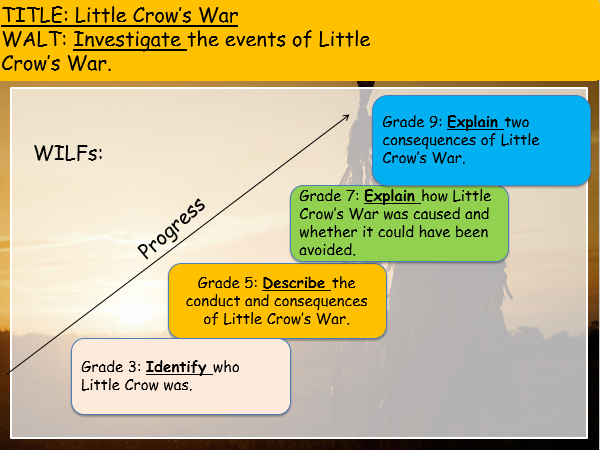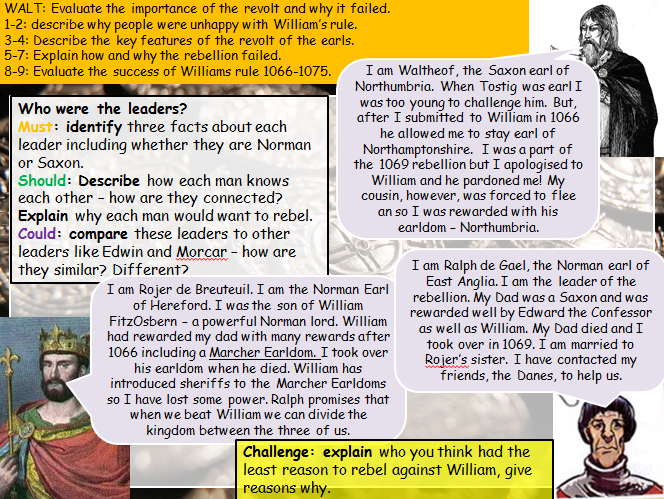
177Uploads
74k+Views
23k+Downloads
All resources

Elizabethan England: Education
A lesson that explores the education system fully differentiated with AFL for each task.
Pupils will:
Identify what education is like today and why it is seen as valuable
Describe why not everyone valued education in Elizabethan England
Explain why attitudes changed
Analyse the education system - was it fair?
Compare the similarities and differences to education today.

REVISION Plots against Elizabeth and Spanish Armada (Edexcel 9-1: Early Elizabethan England)
In this session pupils will cover:
who challenged Elizabeth and why?
Revolt of the Northern Earls
Ridolfi Plot
Throckmorton and Babington
Spanish Armada: causes, conduct consequences
Narrative account practice

KS3 defeat of France (WW2)
Aimed at developing skills required for the GCSE reforms at KS4, this lesson encourages pupils to develop PEEL paragraphs for the explain two consequences question.
This is part of a scheme of work about WW2 - the rest of which can be found within my shop.
Pupils will:
Identify who Winston Churchill is as a hook to the lesson
describe why France surrenders using images to challenge them to think outside of the box
Use a WAGOLL to identify examination skills required and the structure of a PEEL paragraph
Use an information sheet (included) and the WAGOLL to structure their own PEEL paragraph explaining a consequence of the defeat of Poland.
Peer assess their work to reflect on their own progress within the lesson.

KS3 The Blitz (WW2) How useful sources
This is part of a scheme of work that prepares KS3 pupils for the GCSE reforms and skills required for KS4.
Pupils will be provided with opportunities within the lesson to build on their ability to write in PEEL paragraphs, make inferences, and analyse a source to explain why it is useful.
Pupils will:
1 identify what has happened to a building that has been bombed and explain how they know this using an inference
2. watch Pathe primary sources to examine the experiences of Londoners during the Blitz
3. Describe where shelter would be found and explain which was best and why (PEEL)
4. Analyse a source to explain why it is useful for a historian examining the experiences of Londoners during WW2.

Source utility (What is history? (KS3))
This lesson builds on knowledge gained during the BIAS (WHAT IS HISTORY (KS3)) lesson which is available in my TES shop.
WALT: use sources to explore Mayan culture and explain how they are useful to a historian.
L3: Recall key facts we learnt last lesson about the Mayans.
L4: describe two things you can infer from a source.
L5: explain why sources written by the Spanish are limited to a historian.
L6: Evaluate sources written by the Spanish to explain why they are useful as well as limited.
Pupils use sources to develop skills to analyse utility. Pupils are provided by WAGOLLs and heavy support to enable them to access the skill - worksheets are available for LA, MA and HA.

REVISION Life and problems in England (Early Elizabethan England (Edexcel 9-1))
Part of a series of lessons covering content required for the Early Elizabethan England module in the new Edexcel specification.
This lesson covers
Poverty and the poor laws,
education,
past times,
financial weaknesses
There are also opportunities embedded to develop the skills required to answer the 12 and 16 mark questions.

REVISION Elizabethan Exploration (Edexcel 9-1: Early Elizabethan England)
This is the final lesson in the revision bundle for Paper Two Early Elizabethan England on the new Edexcel specification (2016).
This session will cover:
Why exploration was promoted
Drake’s circumnavigation of the globe - consequence question
Raleigh and Virginia (and why it failed)
Planning three explain why questions
15 question quiz to guide future revision of pupils

KS3 Operation Barbarossa (WW2)
Pupils will:
Analyse a source to suggest what the relationship was like between Hitler and Stalin
describe two reasons Hitler chose to invade Russia - guided questions on the PPT for support
suggest what Britain should do - four options to engage pupils before they discover Churchill’s speech as a response
Explain why Stalin was able to beat Hitler - rank a worksheet and then explain one in detail.
create a battle plan as if they are Hitler, what could they have done to beat Stalin?
WALT: Evaluate the causes and consequences of Hitler’s decision to invade Russia.
Level 3: Identify what the relationship between Stalin and Hitler was like in 1941.
Level 4: Describe the causes of the invasion of Russia.
Level 5: Explain why Russia were able to beat Hitler.
Level 6: Create a battle plan to try to overcome Stalin.

KS3 Pearl Harbour (WW2)
Full lesson with differentiated activities
Pupils will:
WALT: Explain the causes and consequences of the attack on Pearl Harbour.
Level 3: Identify what Pearl Harbour was and who was involved.
Level 4: Describe the causes of tension between America and Japan.
Level 5: Explain what happened at Pearl Harbour and how America joining the war might affect the outcome of WW2.
Level 6: Analyse a source to explain why it is useful and limited to a historian.

Command word display
Bunting that includes command words for the new specification:
identify, describe, explain, define, recall, evaluate, infer, compare, evaluate

Anglo-Saxon Rebellions 1068-71 (Edexcel History 9-1 Norman England)
Lesson explores: Rebellion of Edwin and Morcar, Rebellion of Edgar Aethling, Hereward the Wake.
Pupils work in groups of three to become experts about a topic before teaching each other, they then explore the outcomes of William’s actions before planning an exam answer to an explain why question.
WALT: Explain why and how people rebelled against William.
1-2: describe why Saxons were unhappy with William.
3-4: Describe events of the three rebellions between 1068-71.
5-7: Explain why the rebellions failed.
8-9: Evaluate the consequences of the rebellions.

REVISION STARTER ACTIVITIES: Entire unit quizzes Medicine Through Time, Edexcel
These quizzes have been designed as 5, 4, 3, 2, 1 tasks to drop into other lessons.
The idea is to use them as a way to interleave prior knowledge into current topics and ensure that knowledge is returned to frequently to develop knowledge retention.
The 5, 4, 3, 2, 1 structure gives students instant formative assessment in which they can then choose a topic to ‘pledge’ to revise that week as part of their homework. Every quiz has a green pen slide with answers to go through with students to support the teacher.
Students find these tasks very fun and engaging and can see where their strengths and weaknesses across a topic lie.
I have designed the task to revise important concepts briefly at least once by the time they have completed all of the starter activities. The activities could also be used as a building block to help students identify what they will be doing for the rest of the lesson (to be used closer to exams when completing revision tasks).

Little Crow's War: Causes, conduct, consequences (American West (Edexcel history 9-1))
Lesson that focuses on causes, conduct and consequences of Little Crow’s war.
Includes a card sort in which pupils categorise ideas into the three groups. They are then asked to explain, link and analyse with the final task.

KS3 D-Day (WW2)
WALT: Explain why the Axis forces were defeated at D-Day.
Level 3: Identify hidden messages in US propaganda.
Level 4: Describe the key events of the D-Day invasion.
Level 5: Explain why Allied tactics lead to success.
Level 6: Compare the Allies and German tactics to explain why the Allies won.
Pupils analyse a source, follow a carousel to create the battle plan shown as the cover image, then read a source to compare British and German weaponry before creating a newspaper article about the invasion.

Poverty in Tudor England
Lesson aimed at KS3, poverty and the poor laws in Tudor England.
describe why people were in poverty
Define the terms able-bodied and impotent poor
Explain how these people were treated and why these categories were necessary at the time.
evaluate how fair these categories were and why.

Elizabethan England: Who should marry Elizabeth I?
Suitors lesson in which pupils study ‘dating profiles’ before creating a speech to deliver to a ‘real life’ Elizabeth in a hot seat style activity. Pupils can then vote on who is the most convincing match or the pupil pretending to be Elizabeth can choose.
Pupils will explore reasons why Elizabeth didn’t want to marry and why her advisors pressured her to do so as well as exploring who wanted to marry her and why.
All tasks fully differentiated for LA, MA and HA.

Elizabethan England: Events of the Spanish Armada 1588 (Narrative Account skills lesson)
WALT: Explain why Phillip launched the Armada
Level 3: identify key features of weapons used during the battle.
Level 4: describe the events of the battle in detail.
Level 5: Explain why Elizabeth won the battle.
Level 6-7: Evaluate the reasons for the victory and which part of the narrative was most important.

I'm a Historian! Ice Mummies Investigation (What is history? (KS3))
This lesson is set up as a pupil led investigation, pupils explore the ‘cave’ to find as much evidence as possible before they run out of time. They then have to use they evidence they have been able to collect to work out what has happened to the Mayan ice mummmy - this lesson is part of a series of lessons that build upon use of sources, interpretations and finally a baseline assessment. These can be found separately or as part of a bundle in my tes shop.
WALT: Investigate the mystery of the ice mummies to come to a conclusion.
L3: identify questions historians need to ask in order to learn about the past.
L4-5: describe key features of the ice mummies and explain what you can learn about the ice mummies from the sources and what clues might mean.
L6: hypothesise what might have happened to the ice mummies.
L6: Create a narrative account analysing the experiences of the Ice Maiden and how she felt.

Baseline Assessment (What is history? (KS3))
This baseline assessment follows the conclusion of the ‘What is history’ scheme of work that can be found in my tes shop. It is set up to mimic the question types of Paper 3 Edexcel 9-1.
This assessment includes all interpretation type questions - 3b, 3c, 3d.

Revolt of the Earls 1075 (Anglo-Saxon and Norman England (Edexcel 9-1))
WALT: Evaluate the importance of the revolt and why it failed.
1-2: describe why people were unhappy with William’s rule.
3-4: Describe the key features of the revolt of the earls.
5-7: Explain how and why the rebellion failed.
8-9: Evaluate the success of Williams rule 1066-1075.

